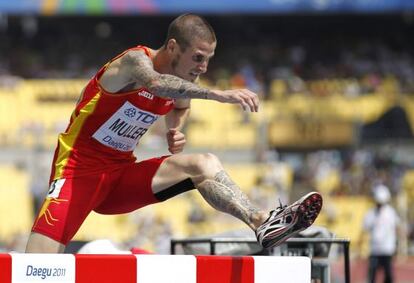Spanish steeplechaser stumbles into doping investigation
Police probe emails between Ángel Mullera and anonymous specialist

Spanish 3,000m steeplechaser Ángel Mullera, a member of Spain’s Olympic track & field team, is under the spotlight after police announced they were investigating a series of emails exchanged between the athlete and an anonymous doping specialist.
The police group behind Operation Skype, which dismantled a doping plot headed by doctor Alberto Beltrán, received the correspondence from an anonymous source several days ago and are tracing the address of the specialist. It has also notified the State Anti-Doping Agency (AEA), whose director Ana Muñoz immediately ordered Mullera to submit to an anti-doping test.
In the first email of the exchange, which Mullera sent last August 29 while competing at the World Championships in Daegu, South Korea, he talked about his plans, the importance of the European Championships in Helsinki for Olympic qualification and the need to run a good time in June or at the beginning of July. He ended the email by giving his particulars.
The response arrived a few hours later.
“An athlete who takes growth hormone can improve his sprint ability by four or five percent and thus potentially go from last to first place on the Olympic podium — and studies have been done on this, it is not made up. In reality, at first we will look to run faster; we will look for the endurance with dynepo, ok? A four-percent increase over 10 seconds, is four tenths, which is an important time lapse — that is what I am putting down.”
Lawyers advised the federation not to probe the case because the email could be false
Both growth hormone and EPO, which comes in the form of Mircera and Dynepo, are banned substances.
“I have Spanish canoeists who are using it [growth hormone] and they are big competitors who I cannot name because it would not be professional,” the advisor-dealer replied to Mullera’s concerns over returning a positive doping test.
Mullera’s final reply in the exchange is: “Stop taking mircera two weeks before the competition, no? But if they give me a surprise urine test three days after stopping the mircera what happens? [...] Give me prices so I know more or less.”
Police have also discovered that the government’s Superior Sports Council and the Spanish Athletics Federation had been made aware of the correspondence several months ago from a series of athletes into whose hands it had fallen, but no action was taken. According to a Federation technical chief, lawyers advised it not to do so because the email could be false and because Mullera had not tested positive.
On July 8 Mullera ran one of the best times of his life, 8:17.43, and on July 9 was named in the list of 50 athletes in Spain’s track & field team for the London Olympics.
Mullera said he was “very calm” about the accusations. “After speaking with the relevant organizations and authorities I will give my version of the facts to clarify everything regarding it,” he said via his Twitter account on Thursday.
He has applied to talk to the Superior Sports Council and the State Anti-Doping Agency, which has requested the parameters of the substances that figure in the email to the World Anti-Doping Agency.
Mullera has been submitted to two surprise doping tests. In one of those he did everything possible to try to prevent it being adequately carried out.
Tu suscripción se está usando en otro dispositivo
¿Quieres añadir otro usuario a tu suscripción?
Si continúas leyendo en este dispositivo, no se podrá leer en el otro.
FlechaTu suscripción se está usando en otro dispositivo y solo puedes acceder a EL PAÍS desde un dispositivo a la vez.
Si quieres compartir tu cuenta, cambia tu suscripción a la modalidad Premium, así podrás añadir otro usuario. Cada uno accederá con su propia cuenta de email, lo que os permitirá personalizar vuestra experiencia en EL PAÍS.
¿Tienes una suscripción de empresa? Accede aquí para contratar más cuentas.
En el caso de no saber quién está usando tu cuenta, te recomendamos cambiar tu contraseña aquí.
Si decides continuar compartiendo tu cuenta, este mensaje se mostrará en tu dispositivo y en el de la otra persona que está usando tu cuenta de forma indefinida, afectando a tu experiencia de lectura. Puedes consultar aquí los términos y condiciones de la suscripción digital.









































